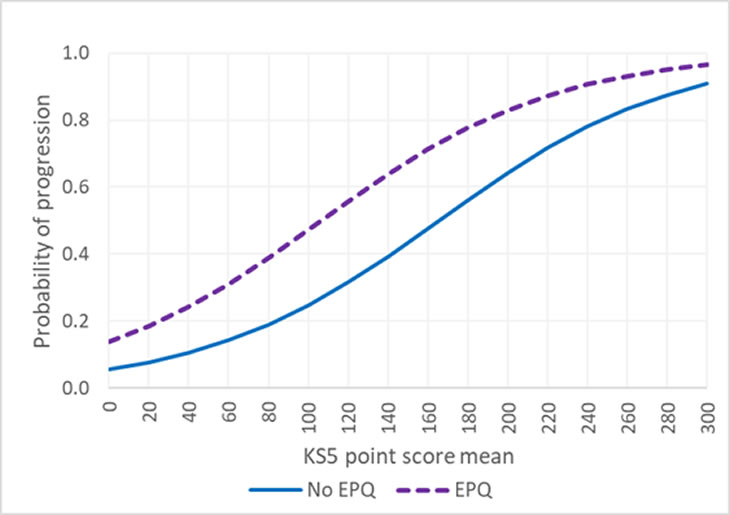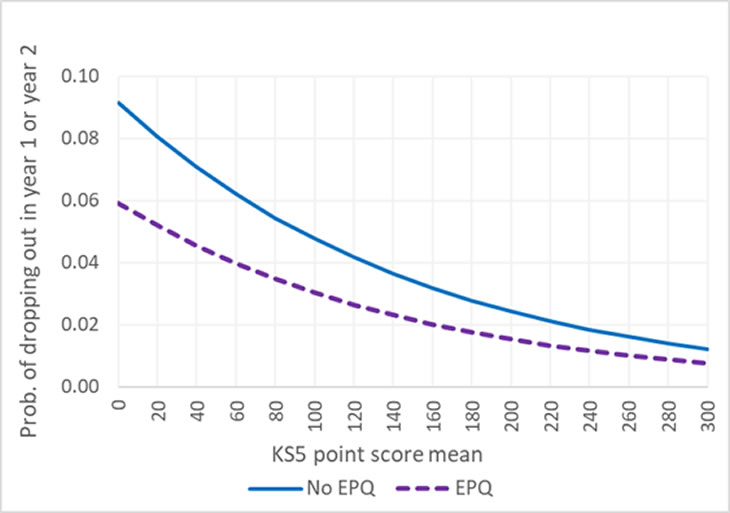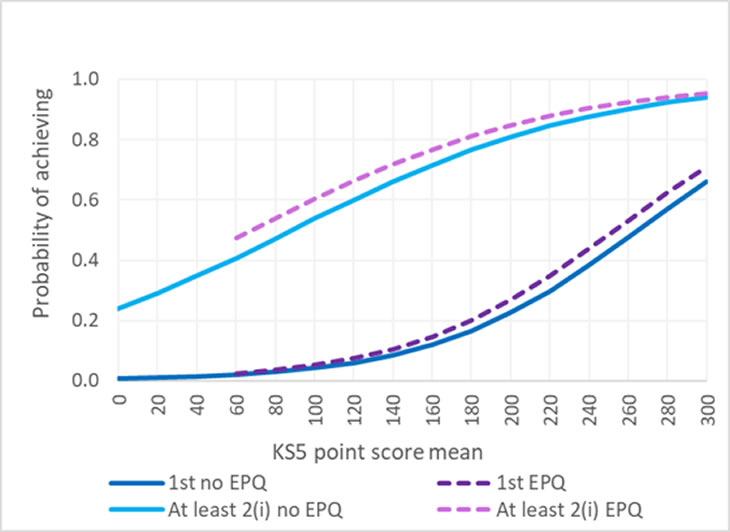The Extended Project Qualification (EPQ) is a Level 3 qualification available for students in Key Stage 5 (KS5), taken alongside other qualifications, such as A levels. In contrast to many academic qualifications, there is no written exam. Instead, students undertake an in-depth project in an area of their choosing. They are required to plan the project, research and analyse sources of information, write up their analysis, draw conclusions and produce an evaluation of the processes involved. These are all skills which are likely to be useful for university study. It is not surprising, therefore, that many universities value the qualification, with some reducing their standard offers to students who have achieved a good grade in the EPQ.
Previous research has demonstrated the potential benefits to students of taking an EPQ. It has been shown to be associated with improved performance in other qualifications taken in KS5. (1, 2) Both students and teachers value the qualification, with teachers reporting that their EPQ students had become more self-confident and resilient (3) and that they believed the EPQ was good preparation for university study. (4) There is also evidence that students taking an EPQ were less likely to drop out of university or achieve a degree class below an upper second. (5)
Our research
Given the potential benefits described above, we were interested to find out whether there was evidence that students taking EPQ were more likely to progress to higher education (HE) and had better outcomes when they got there. This is of particular interest now due to increasing uptake of the qualification in recent years, up to 45,687 in 2019. (6)
Using school exams data from the National Pupil Database linked to university data from Higher Education Statistics Agency, we investigated the following:
- Are EPQ students more likely than non-EPQ students to progress to HE?
- Are EPQ students less likely than non-EPQ students to drop-out of HE?
- Is taking an EPQ associated with better degree performance?
What does the research show?
Progression to HE
We found a significant association between taking EPQ and the likelihood of progressing to HE, even after accounting for other factors likely to affect progression such as prior attainment. In the figure below, we show the predicted probabilities of progressing to HE, for different levels of attainment at KS5. There are two lines, one for students taking EPQ and one for other students. At every level of KS5 attainment, the probability was higher for EPQ students.
To give an example, for students with a mean KS5 points score equal to the mean amongst all students (220, equivalent to one B grade and two C grades at A level), the probability of progressing was 0.87 for EPQ students and 0.72 for non-EPQ students.

Figure 1: Progression to HE
Dropping out of HE
Our second main finding was that EPQ students were significantly less likely to drop out in either year one or year two of their degree course than non-EPQ students with the same level of prior attainment. In the figure below we can see that EPQ students had a lower predicted probability of dropping out at each level of KS5 attainment. However, in practice, because drop out rates were very low in both groups, the differences between EPQ and non-EPQ students were very small.
For an EPQ student with a mean KS5 points score of 230 (the average KS5 performance of students progressing to HE) the predicted probability of dropping out was 0.012, compared with 0.020 for non-EPQ students.

Figure 2: Dropping out of HE
Degree class
Finally, we found that EPQ students had a higher probability of achieving a first (or at least an upper second) in their degree for every level of KS5 attainment. The figure below shows the probabilities of achieving a first or at a least an upper second for different levels of KS5 attainment, for EPQ and non-EPQ students. For example, EPQ students with a mean KS5 points score of 230 had a predicted probability of achieving a first of 0.39, compared to 0.34 for non-EPQ students.

Figure 3: Degree class
What do these findings mean?
Our main conclusion was that there was evidence that taking EPQ was associated with a higher likelihood of progressing to HE, a lower likelihood of dropping out of HE, and higher probability of achieving a good degree, even after accounting for other factors, such as prior attainment. This suggests that EPQ students were better prepared for HE.
However, some caution is necessary when interpreting these findings because a positive relationship between taking the EPQ and being better prepared for HE does not imply causality. For example, in terms of progression, it may be that many students chose to do the EPQ because they had already decided to attend HE and they believed it would help with their preparation. For these students, taking EPQ did not increase their chances of progressing. In terms of drop-out rates and degree class, it may be that academically motivated students were more likely to take an EPQ and it is this motivation which led to better outcomes at HE, rather than taking the EPQ per se.
Where to read more
For more information, see the full report on our website.
References
1↩ Gill, T. (2017). An analysis of the effect of taking the EPQ on performance in other Level 3 qualifications. Research Matters: A Cambridge Assessment Publication, 23. Retrieved from An analysis of the effect of taking the EPQ on performance in other Level 3 qualifications - Document
2↩ Jones, B. (2016) Does the Extended Project Qualification enhance students’ GCE A-level performance? AQA Centre for Education Research and Practice.
3↩ Stephenson, C. & Isaacs, T. (2019) The role of the Extended Project Qualification in developing self-regulated learners: exploring students’ and teachers’ experiences, The Curriculum Journal, 30:4, 392-421
4↩ Williamson, J. and Vitello, S. (2018). AS level trends 2018. Cambridge Assessment Research Report. Cambridge, UK: Cambridge Assessment
5↩ Dilnot, C., Macmillan, L. and Wyness, G. (2022). Educational choices at 16-19 and university outcomes. Oxford, UK: Oxford Brookes University
6↩ Gill, T. (2022). Uptake and results in the Extended Project Qualification. Cambridge University Press & Assessment.